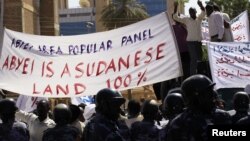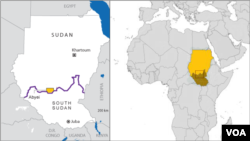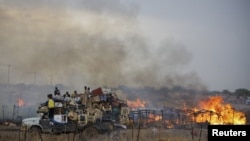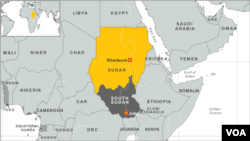ABYEI —
In the disputed region of Abyei that straddles the largely undefined border of Sudan and South Sudan, residents are trickling back to rebuild their lives, following a May 2011 invasion by northern troops that drove more than 100,000 people to the South. A fragile peace remains in this semi-ghost town while the two sides struggle for control at the negotiating table, but residents fear violence could return in the coming months.
A small roadside shelter in front of an abandoned school shows a rare sign of life in Abyei town, as tea seller Achuil Deng waits patiently for the handful of passersby whose purchases enable her to eke out a living.
She once ran a bustling restaurant behind the schoolhouse, where vines creep through the windows and crawl where the roof once was.
“That time it was a very big and good building, so many children were inside and the roof were there and the grounds were so clean, now it is nothing like that. Now everything here is destroyed,” said Deng.
Northern troops, tanks and bomber planes descended on Abyei in May 2011, leaving most of the area's buildings destroyed and all the metal looted.
Small dark circles are still visible where mud-and-straw huts once stood in wastelands now populated by scampering monkeys and ambling storks.
Entire villages and surrounding crop fields were razed. Stolen property included prized cattle, which represent a family’s wealth, future dowry and property.
“Now we don’t have a place to stay and our tukul was already burnt, and we are not comfortable with the issue of security. Because when you have seen the situation before and now and how quickly things can change, people are expecting all the time insecurity,” said Deng.
The United Nations says the 2011 conflict caused more than 120,000 people from the mainly ethnic Dinka Ngok group to flee south.
Only a fraction have returned, and until Sudan and South Sudan can agree on who this area belongs to, it will remain a tinderbox.
Abyei was supposed to have a referendum at the same time as South Sudan in January 2011. After decades of civil war with Khartoum, Southerners voted overwhelmingly to split six months later.
Former Abyei resident Longo Mangom says it was the prospect of a vote that prompted the 2011 crisis. Mangom says Sudan knew the largely Dinka population, ethnically tied to the South, would vote to split.
After years of failed negotiations, a December 5 deadline imposed by African Union mediators passed with Khartoum rejecting a proposal.
If there is no agreement soon, the AU says that Abyei will have to have a referendum in October next year - a vote that Mangom and others fear could be deadly rather than democratic.
“The cause of attack as I put it that two parties did not agree of how they can have the referendum of Abyei as they put it in the protocol," said Mangom. "Now there is other proposal from African union to have a referendum in October ’13. But my feeling is that if the two parties do not agree who is going to vote, I fear that we will face another conflict between the two parties."
Achuil Akol Miyan, acting chief of the Abyei Administration in Agok, says that Arab nomads from the Misseriya tribe have been crossing to southern pastures via Abyei for more than 250 years.
But now, as the cattle export trade from Sudan is rising, along with tensions over the sharing of oil revenue with South Sudan, he claims Sudan has politicized the situation. He estimates that 3 million cows have been stolen in recent years.
“The Islamist government of Omar al Bashir is interested in the Dinka Ngok land," said Miyan. "They don’t want this land to go to the South with the oil. And they are now telling Misseriya to take the land, saying that they will end up with the land for grazing and the government will take the oil for Sudan.”
Sudan's foreign minister has already warned that if the AU passes the Abyei decision on to the U.N. Security Council, there will be violence.
Miyan says that a Misseriya chief has also gone on state TV to broadcast threats of more violence if there is a referendum.
He is more worried about fighting between communities in the next few months, when the Misseriya typically cross. A lack of rainfall this year has led to many watering points drying up, and there are fears that thre may not be enough for even the remaining Dinka Ngok cattle.
Restaurant owner Nyan Agwok Achol says she sees only a very few customers a day from the U.N. peacekeeping force for Abyei, which is stationed nearby.
“We don’t know what’s going to happen later on and so we are just in limbo - we don’t know whether it will be secure of if there will be fighting,” said Achol.
While they wait for an identity and a country, the few residents for now are trying to rebuild their existence, but with the ever present knowledge that soon they couldonce more be running for their lives.
A small roadside shelter in front of an abandoned school shows a rare sign of life in Abyei town, as tea seller Achuil Deng waits patiently for the handful of passersby whose purchases enable her to eke out a living.
She once ran a bustling restaurant behind the schoolhouse, where vines creep through the windows and crawl where the roof once was.
“That time it was a very big and good building, so many children were inside and the roof were there and the grounds were so clean, now it is nothing like that. Now everything here is destroyed,” said Deng.
Northern troops, tanks and bomber planes descended on Abyei in May 2011, leaving most of the area's buildings destroyed and all the metal looted.
Small dark circles are still visible where mud-and-straw huts once stood in wastelands now populated by scampering monkeys and ambling storks.
Entire villages and surrounding crop fields were razed. Stolen property included prized cattle, which represent a family’s wealth, future dowry and property.
“Now we don’t have a place to stay and our tukul was already burnt, and we are not comfortable with the issue of security. Because when you have seen the situation before and now and how quickly things can change, people are expecting all the time insecurity,” said Deng.
The United Nations says the 2011 conflict caused more than 120,000 people from the mainly ethnic Dinka Ngok group to flee south.
Only a fraction have returned, and until Sudan and South Sudan can agree on who this area belongs to, it will remain a tinderbox.
Abyei was supposed to have a referendum at the same time as South Sudan in January 2011. After decades of civil war with Khartoum, Southerners voted overwhelmingly to split six months later.
Former Abyei resident Longo Mangom says it was the prospect of a vote that prompted the 2011 crisis. Mangom says Sudan knew the largely Dinka population, ethnically tied to the South, would vote to split.
After years of failed negotiations, a December 5 deadline imposed by African Union mediators passed with Khartoum rejecting a proposal.
If there is no agreement soon, the AU says that Abyei will have to have a referendum in October next year - a vote that Mangom and others fear could be deadly rather than democratic.
“The cause of attack as I put it that two parties did not agree of how they can have the referendum of Abyei as they put it in the protocol," said Mangom. "Now there is other proposal from African union to have a referendum in October ’13. But my feeling is that if the two parties do not agree who is going to vote, I fear that we will face another conflict between the two parties."
Achuil Akol Miyan, acting chief of the Abyei Administration in Agok, says that Arab nomads from the Misseriya tribe have been crossing to southern pastures via Abyei for more than 250 years.
But now, as the cattle export trade from Sudan is rising, along with tensions over the sharing of oil revenue with South Sudan, he claims Sudan has politicized the situation. He estimates that 3 million cows have been stolen in recent years.
“The Islamist government of Omar al Bashir is interested in the Dinka Ngok land," said Miyan. "They don’t want this land to go to the South with the oil. And they are now telling Misseriya to take the land, saying that they will end up with the land for grazing and the government will take the oil for Sudan.”
Sudan's foreign minister has already warned that if the AU passes the Abyei decision on to the U.N. Security Council, there will be violence.
Miyan says that a Misseriya chief has also gone on state TV to broadcast threats of more violence if there is a referendum.
He is more worried about fighting between communities in the next few months, when the Misseriya typically cross. A lack of rainfall this year has led to many watering points drying up, and there are fears that thre may not be enough for even the remaining Dinka Ngok cattle.
Restaurant owner Nyan Agwok Achol says she sees only a very few customers a day from the U.N. peacekeeping force for Abyei, which is stationed nearby.
“We don’t know what’s going to happen later on and so we are just in limbo - we don’t know whether it will be secure of if there will be fighting,” said Achol.
While they wait for an identity and a country, the few residents for now are trying to rebuild their existence, but with the ever present knowledge that soon they couldonce more be running for their lives.







